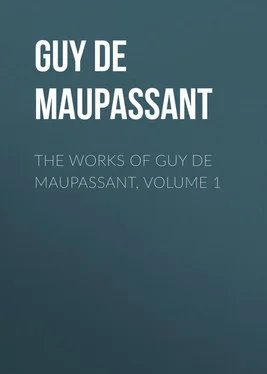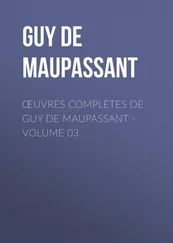Guy Maupassant - The Works of Guy de Maupassant, Volume 1
Здесь есть возможность читать онлайн «Guy Maupassant - The Works of Guy de Maupassant, Volume 1» — ознакомительный отрывок электронной книги совершенно бесплатно, а после прочтения отрывка купить полную версию. В некоторых случаях можно слушать аудио, скачать через торрент в формате fb2 и присутствует краткое содержание. Жанр: literature_19, foreign_antique, foreign_prose, на английском языке. Описание произведения, (предисловие) а так же отзывы посетителей доступны на портале библиотеки ЛибКат.
- Название:The Works of Guy de Maupassant, Volume 1
- Автор:
- Жанр:
- Год:неизвестен
- ISBN:нет данных
- Рейтинг книги:4 / 5. Голосов: 1
-
Избранное:Добавить в избранное
- Отзывы:
-
Ваша оценка:
- 80
- 1
- 2
- 3
- 4
- 5
The Works of Guy de Maupassant, Volume 1: краткое содержание, описание и аннотация
Предлагаем к чтению аннотацию, описание, краткое содержание или предисловие (зависит от того, что написал сам автор книги «The Works of Guy de Maupassant, Volume 1»). Если вы не нашли необходимую информацию о книге — напишите в комментариях, мы постараемся отыскать её.
The Works of Guy de Maupassant, Volume 1 — читать онлайн ознакомительный отрывок
Ниже представлен текст книги, разбитый по страницам. Система сохранения места последней прочитанной страницы, позволяет с удобством читать онлайн бесплатно книгу «The Works of Guy de Maupassant, Volume 1», без необходимости каждый раз заново искать на чём Вы остановились. Поставьте закладку, и сможете в любой момент перейти на страницу, на которой закончили чтение.
Интервал:
Закладка:
"Ma foi – the Prussian commandant."
"Why?"
"I don't know – you had better ask him. I am told not to harness the horses, and so I don't harness them – there you are."
"Did he tell you so himself?"
"No, Monsieur, the innkeeper brought me the message from him."
"When was that?"
"Last night, just as I was going to bed."
The three men returned much disconcerted. They asked for Monsieur Follenvie, but were informed by the servant that on account of his asthma he never got up before ten o'clock – he had even positively forbidden them to awaken him before then except in case of fire.
Then they asked to see the officer, but that was absolutely impossible, although he lodged at the inn.
Monsieur Follenvie alone was authorized to approach him on non-military matters. So they had to wait. The women returned to their rooms and occupied themselves as best they could.
Cornudet installed himself in the high chimney-corner of the kitchen, where a great fire was burning. He had one of the little coffee-room tables brought to him and a can of beer, and puffed away placidly at his pipe, which enjoyed among the democrats almost equal consideration with himself, as if in serving Cornudet it served the country also. The pipe was a superb meerschaum, admirably colored, black as the teeth of its owner, but fragrant, curved, shining familiar to his hand, and the natural complement to his physiognomy. He sat there motionless, his eyes fixed alternately on the flame of the hearth and the foam on the top of his tankard, and each time after drinking he passed his bony fingers with a self-satisfied gesture through his long greasy hair, while he wiped the fringe of froth from his moustache.
Under the pretext of stretching his legs, Loiseau went out and palmed off his wines on the country retail dealers. The Count and the manufacturer talked politics. They forecast the future of France, the one putting his faith in the Orleans, the other in an unknown savior, a hero who would come to the fore when things were at their very worst – a Du Guesclin, a Joan of Arc perhaps, or even another Napoleon I. Ah, if only the Prince Imperial were not so young! Cornudet listened to them with the smile of a man who could solve the riddle of Fate if he would. His pipe perfumed the whole kitchen with its balmy fragrance.
On the stroke of ten Monsieur Follenvie made his appearance. They instantly attacked him with questions, but he had but one answer which he repeated two or three times without variation. "The officer said to me, 'Monsieur Follenvie, you will forbid them to harness the horses for these travelers to-morrow morning. They are not to leave till I give my permission. You understand?' That is all."
They demanded to see the officer; the Count sent up his card, on which Monsieur Carré-Lamadon added his name and all his titles. The Prussian sent word that he would admit the two men to his presence after he had lunched, that is to say, about one o'clock.
The ladies came down and they all managed to eat a little in spite of their anxiety. Boule de Suif looked quite ill and very much agitated.
They were just finishing coffee when the orderly arrived to fetch the two gentlemen.
Loiseau joined them, but when they proposed to bring Cornudet along to give more solemnity to their proceedings, he declared haughtily that nothing would induce him to enter into any communication whatsoever with the Germans, and he returned to his chimney-corner and ordered another bottle of beer.
The three men therefore went upstairs without him, and were shown into the best room of the inn, where they were received by the officer lolling in an armchair, his heels on the chimney-piece, smoking a long porcelain pipe, and arrayed in a flamboyant dressing-gown, taken, no doubt, from the abandoned dwelling-house of some bourgeois of inferior taste. He did not rise, he vouchsafed them no greeting of any description, he did not even look at them – a brilliant sample of the victorious military cad.
At last after some moments waiting he said: "Vat do you vant?"
The Count acted as spokesman.
"We wish to leave, Monsieur."
"No."
"May I take the liberty of asking the reason for this refusal?"
"Pecause I do not shoose."
"With all due respect, Monsieur, I would draw your attention to the fact that your general gave us a permit for Dieppe, and I cannot see that we have done anything to justify your hard measures."
"I do not shoose – dat's all – you can co town."
They all bowed and withdrew.
The afternoon was miserable. They could make nothing of this caprice of the German's, and the most far-fetched ideas tortured their minds. The whole party remained in the kitchen engaging in endless discussions, imagining the most improbable things. Were they to be kept as hostages? – but if so, to what end? – or taken prisoners – or asked a large ransom? This last suggestion threw them into a cold perspiration of fear. The wealthiest were seized with the worst panic and saw themselves forced, if they valued their lives, to empty bags of gold into the rapacious hands of this soldier. They racked their brains for plausible lies to dissemble their riches, to pass themselves off as poor – very poor. Loiseau pulled off his watch-chain and hid it in his pocket. As night fell their apprehensions increased. The lamp was lighted, and as there were still two hours till supper Madame Loiseau proposed a game of "trente et un." It would be some little distraction, at any rate. The plan was accepted; even Cornudet, who had put out his pipe from motives of politeness, taking a hand.
The Count shuffled the cards, dealt, Boule de Suif had "trente et un" at the first deal; and very soon the interest in the game allayed the fears which beset their minds. Cornudet, however, observed that the two Loiseaus were in league to cheat.
Just as they were sitting down to the evening meal Monsieur appeared and said in his husky voice: "The Prussian officer wishes to know if Mademoiselle Elizabeth Rousset has not changed her mind yet?"
Boule de Suif remained standing and turned very pale, then suddenly her face flamed and she fell into such a paroxysm of rage that she could not speak. At last she burst out: "You can tell that scoundrel – that low scum of a Prussian – that I won't – and I never will – do you hear? – never! never! never!"
The fat innkeeper retired. They instantly surrounded Boule de Suif, questioning, entreating her to disclose the mystery of her visit. At first she refused, but presently, carried away by her indignation, she told them in plain terms what he demanded of her.
The general indignation was so violent that nobody was shocked. Cornudet brought his beer glass down on the table with such a bang that it broke. There was a perfect babel of invective against the base wretch, a hurricane of wrath, a union of all for resistance, as if each had been required to contribute a portion of the sacrifice demanded of the one. The Count protested with disgust that these people behaved really as if they were early barbarians. The women, in particular, accorded her the most lively and affectionate sympathy. The nuns, who only appeared at meals, dropped their eyes and said nothing.
The first fury of the storm having abated, they sat down to supper, but there was little conversation and a good deal of thoughtful abstraction.
The ladies retired early; the men, while they smoked, got up a game of ecarté, which Monsieur Follenvie was invited to join, as they intended pumping him skillfully as to the means that could be employed for overcoming the officer's opposition to their departure. Unfortunately, he would absorb himself wholly in his cards, and neither listened to what they said nor gave any answer to their questions, but repeated incessantly, "Play, gentlemen, play!" His attention was so deeply engaged that he forgot to cough, with the result of eliciting organ tones from his chest; his wheezing lungs running through the whole gamut of asthma from notes of the profoundest bass to the shrill, hoarse crow of the young cock.
Читать дальшеИнтервал:
Закладка:
Похожие книги на «The Works of Guy de Maupassant, Volume 1»
Представляем Вашему вниманию похожие книги на «The Works of Guy de Maupassant, Volume 1» списком для выбора. Мы отобрали схожую по названию и смыслу литературу в надежде предоставить читателям больше вариантов отыскать новые, интересные, ещё непрочитанные произведения.
Обсуждение, отзывы о книге «The Works of Guy de Maupassant, Volume 1» и просто собственные мнения читателей. Оставьте ваши комментарии, напишите, что Вы думаете о произведении, его смысле или главных героях. Укажите что конкретно понравилось, а что нет, и почему Вы так считаете.












